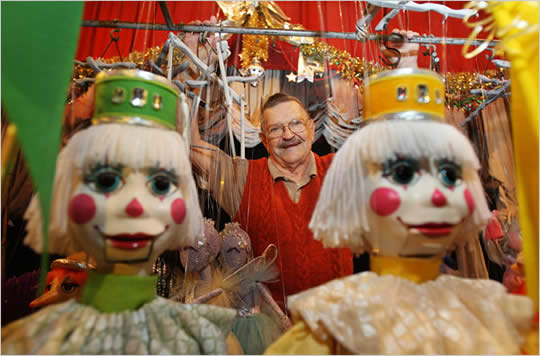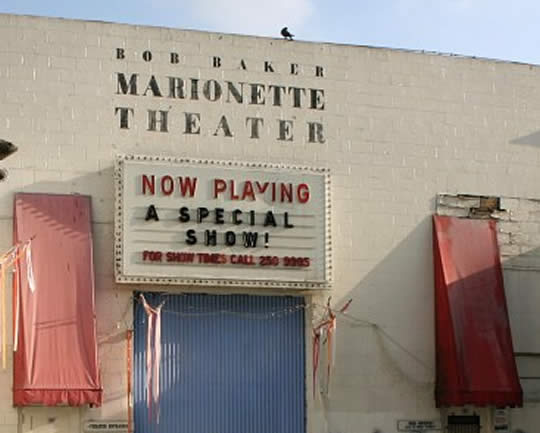 The Bob Baker Marionette Theater and The Academy of Puppetry & Allied Arts will present “Bob Baker’s Celebration & Preservation Extravaganza,” on Sunday, July 29, 2012 at 4:00 p.m. at the Bob Baker Marionette Theater in Downtown Los Angeles. The event has been created to guarantee a future for The Bob Baker Marionette Theater.
The Bob Baker Marionette Theater and The Academy of Puppetry & Allied Arts will present “Bob Baker’s Celebration & Preservation Extravaganza,” on Sunday, July 29, 2012 at 4:00 p.m. at the Bob Baker Marionette Theater in Downtown Los Angeles. The event has been created to guarantee a future for The Bob Baker Marionette Theater.
This event kicks off the non-profit Academy of Puppetry and Allied Art’s fund-raising campaign to raise $2 million to adopt Bob’s puppet family and help build a future for the marionette theater, with the addition of a museum and school for puppetry arts.
Charles Phoenix, a Los Angeles performer, humorist and self-proclaimed “retro daddy,” will be the Master of Ceremonies.
“Bob Baker’s Celebration & Preservation Extravaganza” will be held in the historic marionette theater with a special video tribute to Bob Baker followed by a musical revue featuring the most popular numbers and marionettes from Baker’s repertoire, including clowns, skating Eskimos, and dancing mice, along with a sneak preview of the theater’s latest show in development, “The Arabian Nights.”
Following the performance, guests will have the opportunity to enjoy food and drink and meet Bob Baker and hear Hollywood puppet-lore in the theater’s famous party room. The fundraiser will feature a silent auction of rare marionettes, theater memorabilia and amazing one-of-a-kind items.
Jennifer Steinhauer of The New York Times has described Baker’s shows as “a staple of a Los Angeleno childhood. It is the cultural equivalent of the annual march by the nation’s third graders to the neighborhood firehouse.”
Regarding the current state of affairs at the theatre, Bob Baker says, “I am hoping this fund raiser will raise public awareness and enough money to keep the theater in business.”
To learn more about Bob Baker’s Marionette Theater, we had the honor of speaking to him last week.
Bijan Tehrani: Tell us a little bit about the background of your theatre.
Bob Baker: It started when I was taking dancing lessons and lessons in drama from a German—he ended up doing a Midsummer’s Nights Dream at the Hollywood Bowl. I was going to school while taking piano lessons, all kinds of dancing classes and whatnot, and—at that point I was about five and a half—my dad took me down to Barko Brothers at Flower and 7th to see the first puppet-show of the day, which started at 8:30 when the store opened in those days, and we saw the first show. I was quite intrigued with some of the things that happened and I had to stay to see the second show, and then the 3rd show. Then we had lunch and then I saw the 4th show, the 5th show, then the 6th show, and then came home. My dad could not get my mind off that store; I was so intrigued with the puppets, the lights, and the colors. I did nothing but talk about the puppets for weeks and months, and finally I got one. We went to Bullocks Wilshire where I used money I had saved to buy a Mickey Mouse puppet that was on sale. Then, in December, my mother took me to Bullocks Wilshire again where she said I should pick up my Holiday gift. I picked out two soldier puppets, and my mother asked the demonstrator how on earth I could learn to work these things. I was told that I could come up and take lessons everyday! Of course I did so, and in a year’s time I had collected enough puppets, stage and sound equipment that I could go out and do a show for a birthday party. They sent me to the Mervyn LeRoy’s home and I did a show for them; I was just eight years old and I got a whole 15 dollars during the height of the depression, which was a lot of money in those days! I went to back to Bullocks Wilshire the next day and I told them I’d be happy to do shows for them. They agreed and they actually kept sending me out until World War II came along. I went to many-a-movie star’s home, or to anybody that wanted a puppet show, and that is how it started.
BT: When was the date that you went to actually see the first show?
BB: That would have been 1933 or ‘34.
BT: Tell us about how the theatre runs today with the presence of digital media.
BB: We have a lot of competition from different types of media today. Cartoons became the puppet shows of the United States. Puppets were still sought after during the rise of cartoons, but advances in creating movement kind of killed the puppetry. Long ago, we did the first Polar Express with puppets. For years, I used to be called to do a butterfly that would fly and a dog would chase it and so forth—I used to get called for specific things like that, but now they can do it with different mediums. It’ll be a little time, but I think that they will be calling us again to do that stuff. There are unique feelings and moments that only puppets can conjure.
 BT: I know that a number of governments offer financial help for marionette theatres because it is such a unique and great art. What is your experience with how different cultures view puppetry?
BT: I know that a number of governments offer financial help for marionette theatres because it is such a unique and great art. What is your experience with how different cultures view puppetry?
BB: A lot of that has stopped in the last few years because they have run out of money, but the attitudes definitely vary. In Russia, they had some great puppet theatres there and they were doing great things under the communist Russian regime. Some countries look down on puppet theatres a little bit: our country has always felt that it is frivolous entertainment or children’s entertainment. Actually, every place else in the world, it is adult entertainment and they use very adult things for their plays and whatnot. I asked a professor at UCLA about what makes the difference between a child show and an adult show, and he said “low key lighting.” I know he was goofing me, but that is about the difference because there are things that I have done in the past that are definitely adult. We have done a reading of Poe’s “The Raven”; it is a beautiful adult piece, and Channel the Weed, which is a thing on dope, done artistically. Those are adult things where we do not show the children. I was criticized by one man from Lithuania who he asked me what kind of message I’m giving the children. I said the only message we give them is to say please and thank you, and that type of thing. I said we have no message, and he stormed out and said that puppet shows must have a message.
BT: Watching your show today, I found it to be an amazing and beautiful show, and I think it is important for everyone, adults or children, to find this kind of art again and rediscover it.
BB: We do need to be rediscovered! The people have gone off to see the movies, but the movies today are not the kind that I grew up with and studied in school and worked apart of; they are violent and hateful. What we are trying to do here is show a little love for a change. I think the parents can feel that when they come here and we try to tell them that we want the puppets to come up and caress the children and see them up close. It’s amazing! The puppet will come up close to them and dance close to them! We took the puppets off the puppet stage basically years ago for a number of reasons. Before that, we spent so much time leaning down and telling the children to sit down and not to come on the stage, and finally I said, “Why don’t we do away with all of that?” I did a show for the Rockefellers at the Beverly Hills Hotel, and I did not take the stage. It went over so well and the children liked it so much, that I decided that this is what I am going to do from now on, and that was about 50-60 years ago.
BT: You are bringing other cultures, like Latino culture, to the kids in a very nice and unique way. 
BB: One of the things that I have never done that I wanted to do is daytime television. My partner and I used to go to our producer and say, “We have to put these puppets on film!” Our producer would say, don’t you know you don’t do that with television, television is a live medium and you don’t use film. I would say, “Well I got news, they do!” But we got so busy with the theatre that we lost track of all of the film that we wanted to do. Believe it or not, some of the things that we thought about sixty years ago have not been done yet. I think maybe if I could still hold together, with a little spit and chewing gum, that I might produce it sometime soon.
BT: Tell us about the fundraiser you have planned for next weekend.
BB: We are going to have the first of a series of fundraisers. We have a very bad mortgage that needs to be rewritten. We are not out to save everything outright, we just want to make it go on for another fifty years, so therefore we have to pay a few bills. The government wants a bill paid here, taxes are in the back, and we have to get all of that straightened out. This is just the first of many fundraisers to help us. We hesitated in the past—my business partner, who passed away about 4 years ago, never liked to ask people for money. He would say, have them come and enjoy, look like you have plenty of everything and we can go on for a couple of years without anybody having to hurry. However, it’s to the point now that we have just run out of cash. Even our non-profit component, which helps children that cannot afford to come, is suffering. That’s just one of the things that the non-profit does among its many functions. Also, if people want to give the non-profit a gift, they can write off any contributions, or they can give to the theatre where all help is appreciated as well. We need to change our backlighting systems in here—what we have is pretty bad—get some newer kinds of lights and staging material, and also build a couple of new shows. It takes around 10,15 or $20,000 to build a show with about a hundred puppets in it. The reason we can do it for that low of a price is that we have the people that are working here with us. Normally, something like that, if you build it for someone else, it could run up to 50 or $60,000. We are hoping that people will hear or see one of the ads, so they don’t necessarily have to come see the show next week, they can always send us a little token by e-mail or they can get in touch with us. We are very happy to get anything, believe it or not. Also, ticket sales will always increase our chances of survival. That is what happened with the country; ticket sales dropped way down and we have lost a lot of the movie work we used to do, which brought in good, big money.
BT: I wish you luck and success, and I hope to see the rebirth of the work you are doing.
BB: I hope that we can have a rebirth. I hope that this country can see a more prosperous future ahead so that we can bring people in to buy tickets and enjoy the show. There is just a lot that we want to do. I told the staff, the day after we do the first fundraiser, we will sit down and start reorganizing the way we are going to produce and teach. We are trying to raise money for our school to put up on the hill, along with the building that houses the library and a lot of the archives.

